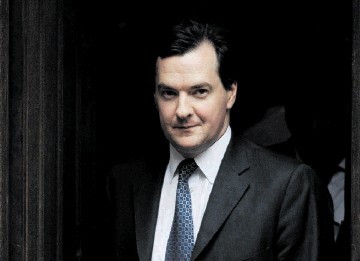
The UK oil industry, after chafing at suggestions it’s subsidized by the state, wants Chancellor of the Exchequer George Osborne to help save it from the market’s crashing prices.
Osborne’s Autumn statement tomorrow, setting out tax and spending policies, is a chance for the more than 500 companies represented by Britain’s oil lobby to press for what it says is a fairer deal. In a letter sent to the chancellor last month, Oil & Gas UK said the collapse in prices comes on top of a 26% jump in unit costs for the industry last year alone.
“Expect news on how the government will look to shore up investment in the North Sea,” said Sanjeev Bahl, Numis Securities Ltd.’s director of oil and gas equity research.
Britain has suffered the steepest drop in output of any major producer since supply peaked 15 years ago. Production has declined about two-thirds, with Oil & Gas UK persistently missing production forecasts. Now, with oil revenues sinking, investment to unlock an estimated 20 billion barrels still trapped under the seabed is increasingly at risk.
The lobby is calling for the UK to reverse an increase in profit charges imposed in 2011, introduce a uniform allowance for capital investment, bring in tax incentives for exploration, and eventually lower petroleum-revenue tax to zero.
Its trump card is Osborne’s pledge, included as a sweetener when he raised the charges on earnings in 2011, to cut them back again if oil prices fell to $75 a barrel. Then, few would have predicted such a dive as North Sea Brent crude sat around $115. Brent was below $69 a barrel yesterday in London.
Oil producers have had the chance to put forward their case during 12 weeks of consultations for a review of the industry’s future to be released alongside Osborne’s statement.
Its focus is on support “through a lower tax burden over time,” Chief Secretary to the Treasury Danny Alexander told an Energy Institute dinner for industry professionals in Scotland’s oil town of Aberdeen on November 6. “Obviously I can’t pre-empt the findings now, but our direction of travel is one which I hope industry will find positive.”
Premier Oil Plc was among companies consulted, Chief Executive Officer Tony Durrant said in October, adding that the government should offer exploration incentives.
Pretax returns for producers’ offshore operations have fallen to levels last seen in 2005 when oil was less than $50 a barrel and tax was 22 percent lower, Oil & Gas UK said Nov. 5.
“Without swift action, capital investment is set to halve by 2017,” CEO Malcolm Webb said. “Urgent tax reform is now needed for the North Sea to remain globally competitive and attractive for investors.”
Meantime, the lobby has wailed against accusations it’s looking for state hand-outs, when the government is slashing welfare for individuals. Offshore oil and gas output pays the highest corporate taxes, from 62 percent to 81 percent, it says.
“It is disingenuous and misleading to suggest that the offshore oil and gas industry has been a recipient of subsidies,” Webb said in a statement on Nov. 14.
Others say the lobby has a narrow definition of subsidy.
Parliament’s Environmental Audit Committee found in a report into the matter last year that field allowances for North Sea oil and gas represent a subsidy because the higher tax rates for producers compensate for the use of state-owned deposits. The Overseas Development Institute, a U.K. think tank with donors including the government and the World Bank, said in a Nov. 11 report that Britain has introduced subsidies for exploration valued at as much as $1.2 billion a year.
The government may not want to test industry warnings that squeezed profits mean explorers will abandon the North Sea’s maturing resources. Oil-services company Petrofac Ltd. last week said earnings are being hurt as tumbling prices discourage industry investment.
“A strong signal of intent to reduce the tax burden and simplify the regime needs to be delivered in the Autumn statement,” Derek Leith, head of oil and gas taxation in the U.K. at Ernst & Young LLP, said by e-mail. “The current headline rate is too high for the maturity of the basin.”
Recommended for you
